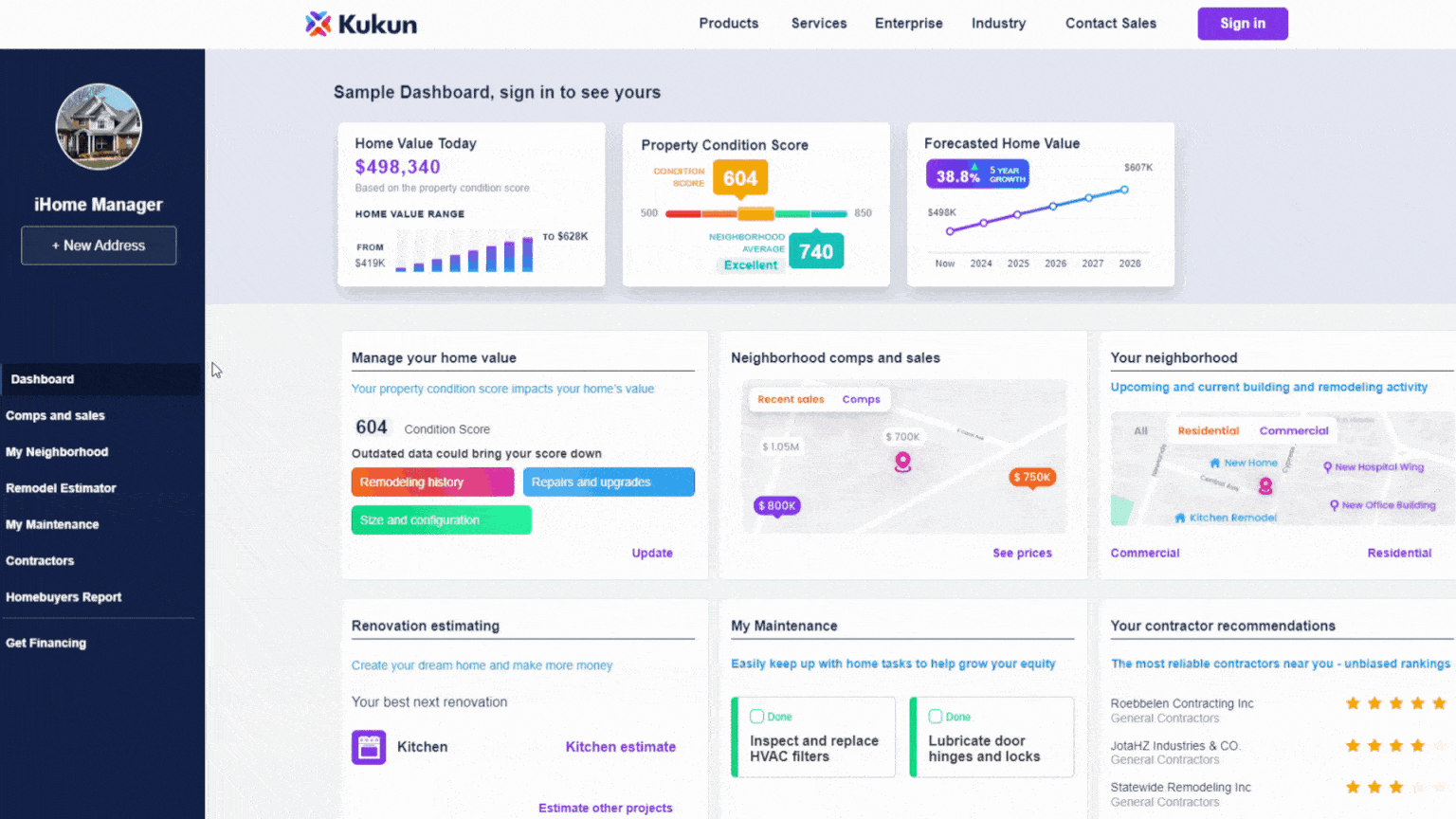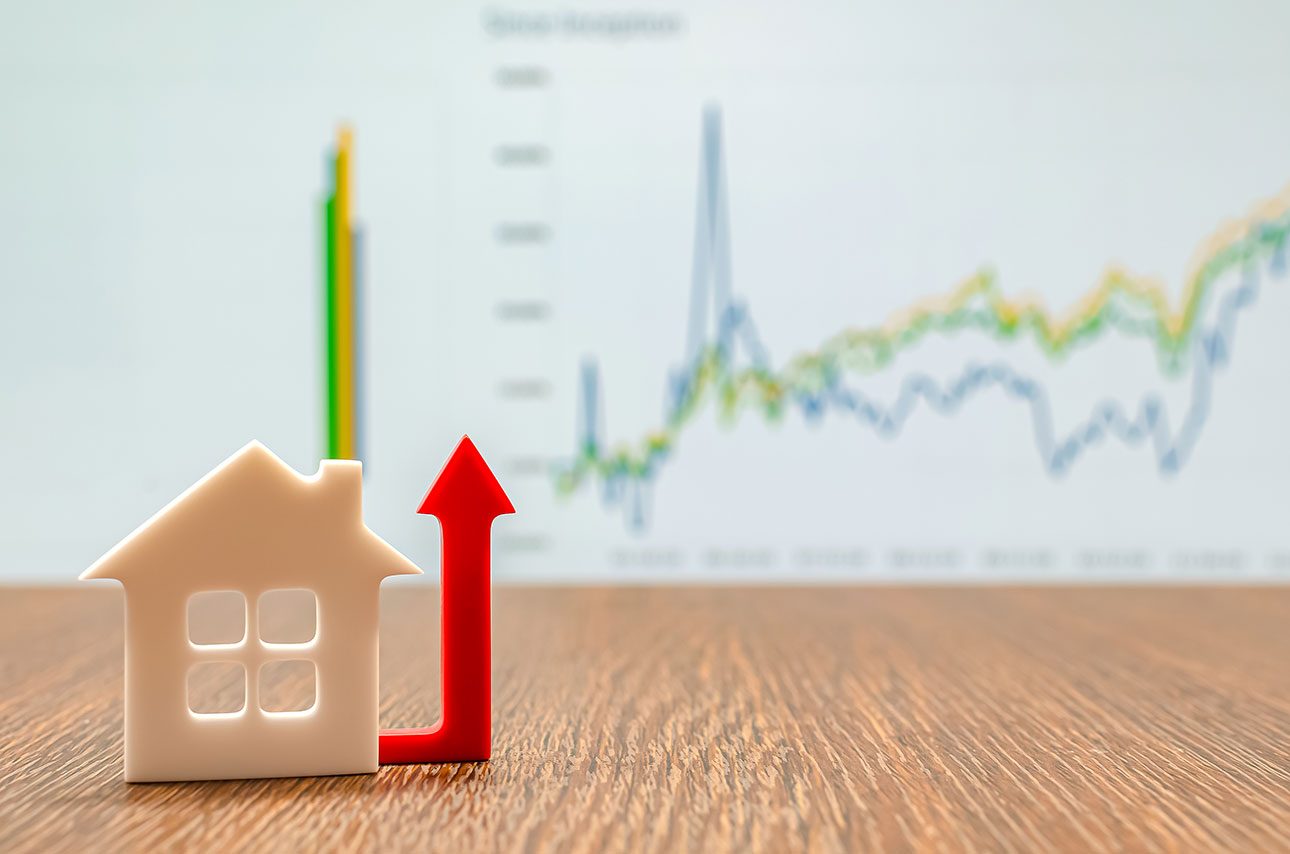How to increase home value by taking the right steps
Updated Mon, Aug 18, 2025 - 10 min read
Top blog articles
Buying a new home goes beyond just emotions. It involves making a sound financial choice that can yield returns on investment (ROI) through equity growth and appreciation of property value. So, how to increase home value over time and enjoy the benefits of your purchase?
Well, this value appreciation relies on several factors such as the housing demand in the area, the type of neighborhood it is, and the overall economic conditions. And, on the condition of your house – something you can work toward.
As a homeowner, you have the power to influence your property’s value. All you need to do is make the right home improvements that enhance its appeal. A nice-looking and comfortable house will not need much justification for a higher selling price in the future.
How to increase home value?
Updating your home not only enhances its appeal to buyers but also influences its value. Consequently, this can lead to receiving higher offers and expediting the home-selling process.
The right type of renovation can contribute significantly to a home’s value. When your home is move-in-ready and modernized, it becomes easier to justify setting a higher asking price.
Keep in mind that real estate pricing often relies on comparative sales, or “neighborhood comps,” which refer to the sale prices of similar homes in your locality. These comps take renovations into account when evaluating a property. That is to say, if your home is newly renovated while your neighbor’s is outdated, your property will be deemed more valuable by prospective buyers.
Additionally, making certain value-adding improvements can result in potential savings on capital gains taxes when you eventually sell your home. When you sell an asset such as a house, you are typically subject to a capital gains tax based on the appreciation of the home’s value from the time of purchase, including the value of any capital improvements, to the time of sale. By investing in renovations now, you can increase the adjusted cost basis of your home, which can help offset the capital gains tax when you sell. Consulting a tax advisor can provide you with more details tailored to your financial situation.
It’s worth noting that if you owned and used the property as your main home for at least two of the previous five years, you may qualify for a tax exemption of up to $250,000 ($500,000 if married and filing jointly) in capital gains related to the home sale.
Can you actually see your home value?

Yes, you can. Kukun iHomeManager lets you do that and much more. You can see your actual property condition score on a scale of 500 to 850. This home value report card is based on proprietary home data, neighborhood comps, the type of upgrades you’ve made to your home, its date of construction, and so on
By just entering your residential address, you can gain invaluable information about real estate values and value-adding parameters in your area. And, you can keep track of your home value through repairs and remodels.
What else does Kukun iHomeManager do?
- It helps you take charge of understanding, tracking, and managing your home value.
- You can evaluate the influence of home upgrades and devise strategies to maximize your equity while staying informed about your neighbors’ renovations.
- Determine the most effective renovations and their optimal cost.
- Receive timely notifications regarding essential maintenance tasks that contribute to maintaining your home’s value.
- Familiarize yourself with the projected value of your property for the next five years and observe changes as you update the property’s condition.
How should you go about increasing home value?
Whether your intention is to prepare your home for a sale or enhance the value of your home investment over time, there are numerous measures you can take to boost its worth. After all, when it’s time to sell your house, your goal should be to maximize the return on your investment.
Keep in mind that potential buyers are often willing to pay a higher price for a house that has had practical renovations, updated decor, and modern gadgets. That’s why, it’s crucial to identify which improvements are worth the expense.
Here’s how to increase home value in a systematic way.
- Understand your goals before deciding on which home renovations will make the most sense for you in the next five to 10 years.
- Create a home remodeling budget by using Kukun Remodel Cost Estimator.
- Choose if you want professional renovation work or a DIY project. You can hire the best contractors in your area for a complex task.
- Select the best way to pay for your home improvements. It could be through a personal loan, a home equity loan, a home equity line of credit (HELOC), or a cash-out refinance. Using a credit card for funding a large-scale renovation may not be such a good idea – unless the credit card company is offering you 0% APR.
- Choose home improvement projects that will get you the maximum ROI and improve your property score.
Which are the best ways to pay for your home renovations?
When you undertake significant home improvements or additions, you’ll need to choose a suitable payment method. Here are some financing options for you.
- Personal loan: A personal loan allows you to borrow a fixed amount of money with a fixed interest rate. These loans are unsecured, meaning you don’t have to provide collateral such as your home or property to get approved. Lenders often offer amounts up to $35,000 or more for home improvements, which you can repay over time.
- Home equity loan and HELOC: Similar to personal loans, home equity loans provide a lump sum of cash with a fixed interest rate and fixed monthly payments. On the other hand, Home Equity Lines of Credit (HELOCs) work like credit cards, offering a variable interest rate and a line of credit to borrow against. Both these options require using your home as collateral to qualify. The advantage is that you might secure a lower interest rate compared to personal loans, and the interest may be tax-deductible if used for eligible home improvements.
- Cash-out refinance: If you’ve accumulated equity in your home and need funding for major renovations, a cash-out refinance could be an option. It allows you to obtain funds while securing a lower interest rate on your existing mortgage. However, keep in mind that the refinancing process involves paperwork and closing costs. To maximize savings, it’s wise to shop around for the best refinance rates.
- 0% APR credit card: For smaller-scale home improvement plans, you can consider using a 0% APR credit card instead of taking out a loan. Many credit cards offer interest-free periods of up to 18 months, making them ideal for such projects. However, it’s important to remember that if you don’t pay off the balance within the zero-percent APR period, the interest rate will reset to a higher variable rate, leading to increased costs.
Which projects will increase your home value the most?

Adding livable square footage
Expanding the usable space of an existing home can be a financially smart decision, especially in areas where available land is limited. This almost always leads to an increase in the overall value of the home. Generally, the more livable square feet a home has, the higher its desirability, functionality, and market value. For example, adding a separate mother-in-law suite or an accessory dwelling unit can prove to be a smart investment.
Upgrading paintwork
Outdated interior paint or peeling paint on the external walls can be unappealing. Applying a fresh coat of paint is a cost-effective staging technique. Plus, it’s one of the cheapest ways to give your home a makeover. For a DIY paint job, anticipate spending around $20 to $125 per gallon of paint, depending on the quality and finish you choose. Alternatively, hiring a professional painter may cost you between $1,000 and $2,900 in total or $2 to $3 per square foot.
Giving your kitchen a complete makeover
A modern, updated kitchen is a favorite among buyers. However, it’s essential to know that kitchen renovations do require a significant financial commitment.
Did you know, investing as little as $5,000 in your kitchen can yield up to 7% returns when selling your home?
You could begin your kitchen renovation by
- Replacing old kitchen appliances with new, Energy Star-certified appliances.
- Applying a fresh, neutral coat of paint to the walls.
- Updating the backsplash.
- Repainting the cabinets.
- Replacing cabinet hardware.
- Installing granite countertops.
According to the National Association of Realtors (NAR), a kitchen upgrade is estimated to cost around $38,000. A full kitchen renovation could go up to $68,000.
Updating the bathroom
Another part of your house that buyers consider when choosing a home is the bathroom.
- Replace outdated wallpaper or get a neutral coat of paint.
- Upgrade hardware on drawers, cabinets, and closets.
- Replace old light fixtures with energy-efficient LED fixtures.
- Replace leaky faucets and showerheads.
A full bathroom remodel costs around $35,000. According to NAR, the cost recovery is approximately 57%. That is to say, you can expect to recoup about $20,000 when you sell your home.
Making your home energy-efficient
You can actually reduce your utility bills by making energy-efficient home additions. They will also attract potential buyers. Depending on the extent of eco-friendliness you are seeking, energy improvements may range from $100 to over $40,000.
- Consider hiring a home energy auditor to identify energy inefficiencies in your home. They would suggest cost-effective methods to reduce your energy consumption. This consultation typically costs around $400.
- Upgrade to energy-efficient windows. These windows can decrease your home’s energy costs by up to 12% while also lowering its environmental impact.
- Install solar panels on your roof. It significantly enhances your property’s value and showcases its energy efficiency to potential buyers. Keep in mind that the average cost of solar panel installation can be as high as $25,000.
Read more: How to increase home value by 50000$
Focusing on your curb appeal
Enhancing your home’s curb appeal can significantly impact its overall value. Hiring a professional landscaper may cost you approximately $6,000 – depending on your yard’s size and location.
You can try all of these regularly to give your home exterior an upgrade.
- Invest in exterior painting.
- Power wash the driveway.
- Hire professionals to clean the doors and windows.
- Improve outdoor landscaping with plants, yard maintenance, fence painting, and lawn mowing.
- Replace an outdated front door or a garage door with a trendy one.
Read more: How do you get remodeling leads
Last thoughts
As a smart homeowner, you probably see your home as not only a place to live but also as one of the best ways to build wealth through home equity.
If you plan to sell your home quickly and at a premium price, your attention should be on hiring the best real estate agent and on home improvement projects, such as painting, simple landscaping, and installing modern light fixtures.
But if you prioritize building equity and don’t intend to sell for another decade, you can take your time to undertake significant renovations, such as remodeling the kitchen or bathroom. Once you make well-planned upgrades, you can watch your property score go up!
Read more: Should I sell my house now?









